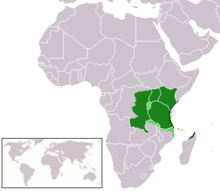Swahili, also known by its native name Kiswahili, is the native language of the Swahili people, who are found primarily in Tanzania, Kenya and Mozambique (along the East African coast and adjacent litoral islands).[8] Although linguistically categorised as a Bantu language, Swahili has borrowed a number of words from foreign languages, particularly Arabic, but also words from Portuguese, English and German. Around forty percent of Swahili vocabulary consists of Arabic loanwords,[9] including the name of the language (سَوَاحِلي sawāḥilī, a plural adjectival form of an Arabic word meaning 'of the coast'). The loanwords date from the era of contact between Arab slave traders and the Bantu inhabitants of the east coast of Africa, which was also the time period when Swahili emerged as a lingua franca in the region.[10] The number of Swahili speakers, be they native or second-language speakers, is estimated to be approximately 200 million.[11][12]
Due to concerted efforts by the government of Tanzania, Swahili is one of three official languages (the others being English and French) of the East African Community (EAC) countries, namely Burundi, Democratic Republic of Congo, Kenya, Rwanda, South Sudan, Tanzania, and Uganda. It is a lingua franca of other areas in the African Great Lakes region and East and Southern Africa, including some parts of the Democratic Republic of the Congo (DRC), Malawi, Mozambique, the southern tip of Somalia, and Zambia.[13][14][15] Swahili is also one of the working languages of the African Union and of the Southern African Development Community. The East African Community created an institution called the East African Kiswahili Commission (EACK) which began operations in 2015. The institution currently serves as the leading body for promoting the language in the East African region, as well as for coordinating its development and usage for regional integration and sustainable development.[16] In recent years South Africa,[17] Botswana,[18] Namibia,[19] Ethiopia,[20] and South Sudan[21] have begun offering Swahili as a subject in schools or have developed plans to do so.
Shikomor (or Comorian), an official language in Comoros and also spoken in Mayotte (Shimaore), is closely related to Swahili and is sometimes considered a dialect of Swahili, although other authorities consider it a distinct language.[22][23] In 2022, based on Swahili's growth as a prominent international language, the United Nations declared Swahili Language Day as 7 July to commemorate the date that Julius Nyerere adopted the Swahili as a unifying language for African independence struggles.[24]




No comments yet
Be the first to share your thoughts!